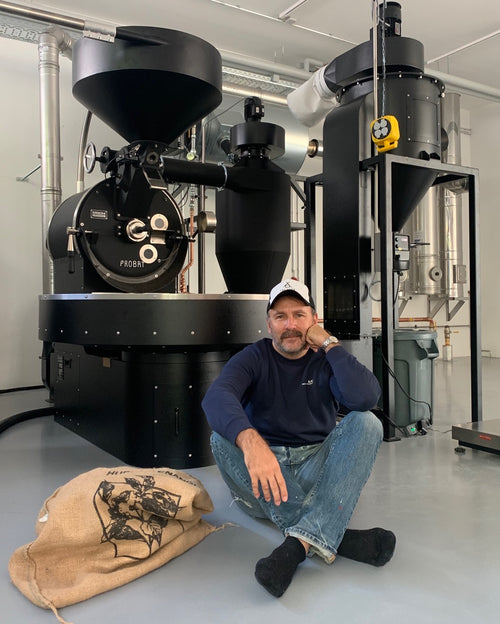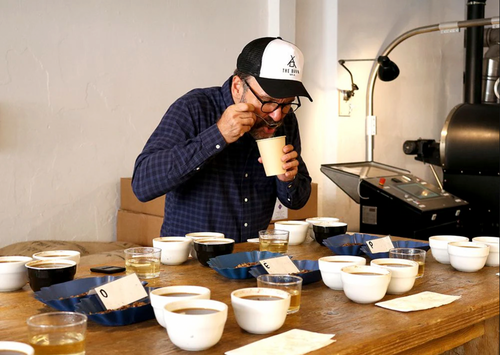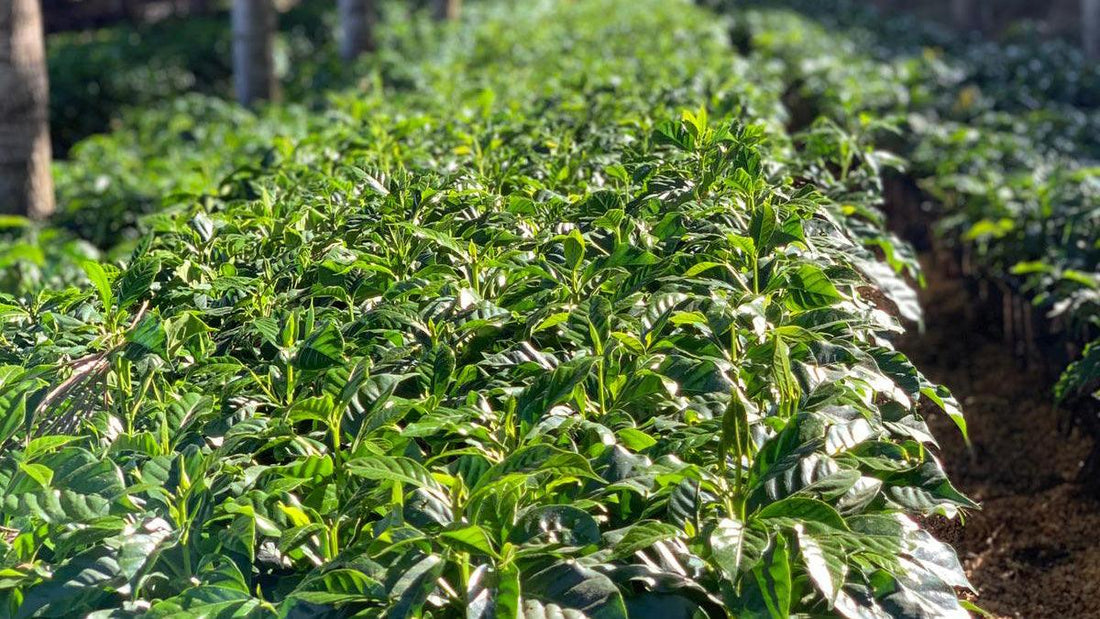
Coffee has been produced commercially in the country since the 1850s, and by the 1880s it was the fourth-largest producer in the world. It was around this time that Gilberto Baraona’s family moved to El Salvador and started Los Pirineos, which makes the farm over 125 years old. It has been in his family for five generations, and is still going strong despite the country only producing half as much coffee as it did when they started. In February 2019, Ralf visited Gilberto at Los Pirineos.
El Salvador has ideal growing conditions. It isn’t exposed to the Atlantic, so there is no threat of moisture or monsoons like there is in countries like Costa Rica. Los Pirineos reaches up the slopes of Tecapa volcano to an altitude of 1400 metres, making it one of highest washing stations in El Salvador. It is exposed it to a cooling breeze that comes through the mountains, as well as just the right amount of sun, keeping the average temperature at 28°C. Other processing mills in the area sit a lot lower, at around 600-700m, and average temperatures can get as hot as 40°C. In this heat, coffees dry much too fast and they don’t seem to maintain their qualities as long as coffees dried in cooler temperatures.


Throughout the 1980s, many Central American coffee producers began replacing their heirloom varietals with high-yield plants, which compromised cup quality. El Salvador, however, was one of the few countries that didn’t do this so about 68% of the coffee produced there comes from heirloom Bourbons. Over the last 10 years, Gilberto has been rolling out a new varietal planting programme. He discovered 16 varietals that grow successfully in his soil, all of which will be available over the next couple of years. This is a long process, as coffee plants need to grow for two to three years before they produce cherries. The 16 varietals include 2x Geisha, 2x Kenyan (SL28 and Batian), 5x Ethiopian Heirloom, 3x Bourbon, 3x Pacamara, and 1x Laurina (Just for us! we will be roasting it next year).
A very dry summer last year means Gilberto’s yield is down by 15% this year. In 2018, May and June brought a lot of rain, but was followed by 38 days of drought. This had an impact on the yield, but luckily the plants stayed in good shape so there was no impact on quality.


Los Pirineos’ harvest is always a bit later than other farms in El Salvador. Higher elevation and colder temperatures causes cherries on his plots to ripen slowly. Slow ripening allows the cherry to develop more sweetness and complexity. Naturals always come later in the season as they take longer to dry, but the African Drying Beds (more on this below) used at Los Pirineos also slow down the process. Gilberto’s naturals are very popular, so this year he will begin his harvest in December/January in order to deliver earlier in the season. His final harvest will be the second week of March, which defines the end of season and beginning of shipment.
The need for shade is dependant on micro-location of drying beds, wind, and presence of clouds. A good producer knows if he needs shade for drying and, if so, how much.This defines the drying time, which has an impact on both flavour and shelf life. At Los Pirineos, coffee is dried on raised African drying beds, which keep the cherries off the ground and allow air to circulate more easily, and shade is provided by mesh covers that sit 1.5-2 metres above the drying beds. The level of shade is measured on a scale from 48% to 80%, and Gilberto stays at 50%. Coffees are dried to a moisture level of 10%, which is what we look for in our coffees. Anything above 12% is problematic, as the coffee has a higher chance of rotting and will not be as clean in taste.


Los Pirineos boasts a fantastic on-site processing facility, with an emphasis on cleanliness, organisation, and attention to detail. Gilberto’s honey processed coffees are a great example of this. He uses Eco Pulpers with which the level of water pressure can be adjusted, depending on the level of left-over mucilage desired. This allows Gilberto to produce the full range of honeys - white, yellow, red, and black. The farm is also eco-friendly and uses natural filtration systems.
Alongside running a very successful coffee farm and dry mill, Gilbert Baraona is still able to find time to experiment and innovate. Recently he has been experimenting in carbonic maceration with our friend Sasa Sestic. While I was there, Gilberto was also experimenting with three different types of yeast from coffee yeast producer Lalcafé. He is one of a few advanced coffee growers trying to accelerate the processing methods by adding yeast. Three different yeast strengths are currently being trialled, which will hopefully have a positive impact on flavour (and perhaps increase his scoring even more).


We will make our final selection of microlots from Los Pirineos in the next couple of weeks. One of the coffees we feature year after year is their Bourbon Elite washed - a clean, delicate espresso with floral notes supported by creamy chocolate and toffee flavours. This will be delivered to us in the late summer, and will taste really good in the second half of the year once it has had some time to rest - which adds to the sweetness and makes it even more delicious. We can’t wait to share it with you!













